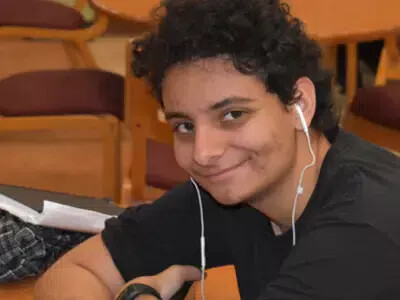One of the core values of Raritan Valley Community College is fostering an environment of mutual respect, responsibility, and collaboration. The Student Code of Conduct (Code) establishes expectations of behavior for all students regardless of enrollment status or campus location. The provisions of the Code govern the actions of all students whether at a College-owned or managed location or at a College-sponsored or supervised function or event. This Code applies to behavior directed toward any member of the College Community as well as a student’s conduct during Academic Placements.
Upon admission to the College, a student incurs the responsibility for becoming familiar with and abiding by, the provisions of the Code. Violations of the Code may result in a student receiving a failing grade on an assignment or in a course, required community service, Disciplinary Warning, Disciplinary Probation, Disciplinary Suspension, Dismissal, or other appropriate penalty.



The following is a portion of the Raritan Valley Community College Code of Student Conduct. The entire document and relevant policies can be found online. If you have questions about the Code of Conduct or Academic Integrity Policy, contact the Dean of Student Affairs in College Center, C-143.
Violations of the Code for Academic Dishonesty, Cheating and Plagiarism
Raritan Valley Community College defines academic integrity as a commitment to independent, original, and honest work. Students are expected to conduct themselves with scholarly integrity. Each suspected incident of academic dishonesty, cheating, or plagiarism will be reported to the Divisional Dean. Upon confirmation of the student’s offense by the appropriate Divisional Dean, the student will be subject to warnings and penalties up to and including suspension or dismissal from the College.
The selling, purchasing, or contributing of homework assignments, lab reports, quizzes, essays, and papers from another person or from online sites is dishonest and illegal (see New Jersey Statute 18A:2-3) and will be addressed accordingly.
Academic Dishonesty and Cheating
Examples of cheating violations include, but are not limited to:
- Copying graded and ungraded homework assignments from another student.
- Working together on a graded assignment that the faculty member has indicated is an individual assignment.
- Looking at another student’s paper during an exam.
- Copying another student’s computer program, class project, or assignment, and submitting it as one’s own.
- Stealing or borrowing all or part of an exam’s questions or answers.
- Entering a computer file without authorization.
- Giving someone answers to exam questions before an exam or while the exam is being given.
- Giving or selling an assignment, term paper, report, drawing, or computer program to another student for submission to the faculty member.
- Deceiving a faculty member to improve one’s grade.
- Falsifying data or a source of information.
- Unauthorized use of any technology to gain access to test answers, test questions or prohibited materials such as notes, online databases and websites during a test.
- Submitting work for a grade that the student already submitted in another class or previous semester without the current faculty member’s permission.
- Submitting work from one course into a second course without permission from the current faculty member.
- Copying quiz questions from Canvas-administered quizzes for private use or for distribution to other students.
- Making up information and citations.
- Using information from study websites (such as Course Hero, Chegg, or Study Buddy) for assignments and submitting it as one’s own work.
- Uploading or sharing an item to a study website (such as Course Hero, Chegg, or Study Buddy)
Plagiarism
Examples of plagiarism include, but are not limited to:
- Copying answers from a textbook, website, or any other print/digital source, to submit for a grade without citations and presenting them as their own.
- Using the instructor edition of a textbook for assignment answers without faculty authorization to do so.
- Quoting text or other works without appropriate citations.
- Submitting a paper paraphrased from sources without citations.
- Submitting work obtained from a term paper service or taken from the Internet.
- Submitting work written by someone else (including another student) as one’s own.
- Submitting a paper paraphrased from source material, splicing together sentences from scattered segments of the original.
- Reproduction of visual media and multimedia materials (videos, etc.) without permission from the artist or appropriate citation and distributing the materials as independent.
- Writing an essay using Google Translate (or any other translation tool).
Students who wish to challenge an accusation of Academic Dishonesty should speak to the appropriate Divisional Dean and may request a formal Disciplinary Review to adjudicate the matter.
Disruptive Behavior in the Classroom
Faculty members have the authority to take actions which may be necessary to maintain order and proper conduct in the classroom. Students whose behavior disrupts the class will be subject to removal and may be charged with a violation of the Code of Student Conduct. Code of Conduct charges will be investigated by the Dean of Student Affairs. If the student behavior presents a concern for immediate safety of the student or members of the community, the student may be suspended until a Disciplinary Review is held.
Raritan Valley Community College requires independent, honest work on the part of its students, and students are expected to conduct themselves with scholarly integrity. Each confirmed incident of academic dishonesty, cheating or plagiarism must be reported by the faculty member, in writing, to the appropriate Divisional Dean. Specific examples of academic dishonesty and cheating can be viewed within the student conduct section of the College website.
For classroom violations, the following additional penalties may apply.
1. Academic Dishonesty
Penalties for confirmed cheating and plagiarism are as follows:
First Offense: The faculty member will have the authority to issue a failure on the paper, exam, assignment or course on which cheating or plagiarism was established. In general, plagiarism that the faculty member considers to be serious and proven shall result in failure for the course. The faculty member must report the violation in writing to the appropriate Divisional Dean.
Subsequent Offense(s): As with the first offense, the faculty member will have the authority to issue a failure for the paper, exam, assignment, or course about which cheating or plagiarism was established and must report the violation. Upon confirmation of the student’s subsequent offense by the appropriate Divisional Dean, the student will be subject to suspension or dismissal from the College.
2. Disruptive Behavior in the Classroom
Faculty members have the authority to take actions which may be necessary to maintain order and proper conduct in the classroom. Students whose behavior disrupts the class will be subject to removal and may be charged with a violation of the Code of Student Conduct. Code of Conduct charges will be investigated by the Dean of Student Affairs. If the student behavior presents a concern for immediate safety of the student or members of the community, the student may be suspended until a Disciplinary Review is held.
Sexual Harassment and Discrimination
It is the policy of RV to provide an environment that is free from harassment and discrimination. Students are encouraged to report any incidents of discrimination, harassment, sexual violence, and bullying which cause physical or emotional harm; or create a hostile environment which interferes with your education or your rights as a student. This includes any gesture, any written, verbal or physical act, or electronic communication, whether it be a single incident or a series of incidents, which you perceive as motivated by race, color, religion, ancestry, national origin, gender, sexual orientation, gender identity and expression, or a mental, physical or sensory disability which substantially disrupts or interferes with the operation of the college or the rights of a student. If you believe you are being harassed report the situation immediately. If immediate attention is needed, always contact Campus Safety by picking up a red phone in the halls or calling 908-231-8800.
Title IX of the Educational Amendments of 1972 specifically prohibits discrimination on the basis of sex in education, programs and activities. Discrimination under Title IX includes sexual harassment or sexual violence, such as rape, sexual assault, sexual battery, and sexual coercion. Confidentiality will always be maintained insofar as it does not interfere with the college’s legal obligation to investigate allegations of misconduct when brought to the college’s attention, and the ability of the college to take corrective action consistent with rights of due process. Title IX policy and procedures can be found by clicking to this page or by viewing the document on this link.
All inquiries and complaints should be addressed to Cheryl Wallace, Vice President of Human Resources & Administration, 908-526-1200, ext 8260. Personal counselors are available for assistance in the Advising and Counseling Office, College Center C-163.
Sexual Misconduct and Violence
Raritan Valley Community College affirms the rights of its students, faculty, and staff to live, work, and study in an environment free from violence and sexual misconduct (sexual assault, sexual harassment, dating/domestic violence, and sexual exploitation). Sex offenses; violate college regulations and criminal law. Any reported violation will be treated swiftly through established college disciplinary procedures and/or legal avenues. Reports of Sexual Misconduct and Violence can be reported to Campus Safety and/or The Office of the Dean of Student Affairs. Confidential support services can also be obtained from our team of counselors within the Office of Advising and Counseling Services and from outside agencies.
Contact Information for the Title IX Coordinator:
Cheryl Wallace, Title IX Coordinator
Vice President of Human Resources & Administration
cheryl.wallace@raritanval.edu
Sexual Consent
Consent is defined as giving explicit permission to participate in any sexual act. Consent must be active, not passive; it cannot be implied or assumed. Each partner must knowingly give permission each and every time they engage in a sexual act.
Consent cannot be given if either participant is:
- under the legal age of consent
- incapacitated
- mentally handicapped/impaired
- asleep
- being threatened, forced or coerced
Code of Student Conduct Violations
All students shall obey the law, show respect for properly constituted authority, and observe correct standards of conduct in the classroom, college offices and on college property. Violations will be reported to the Dean of Student Affairs. In addition to activities prohibited by law or identified under the academic violations, the following types of behavior shall be prohibited and considered violations of the Code of Conduct:
General Violations
1. Violation of any College policy or regulation. This includes violations of state, local or federal law.
2. Repeated violations of established college rules and regulations regardless of the seriousness of the individual offense involved.
Interpersonal Violations
3. Physical or verbal abuse or harassment that injures another person or threatens another person and/or creates a hostile environment for any member of the College community. Subcategories included under physical abuse and harassment also include the following:
a. Domestic violence, which includes asserted violent misdemeanor and felony offenses committed by the victim’s current or former spouse, current or former cohabitant, person similarly situated under domestic or family violence law, or anyone else protected under domestic or family violence law.
b. Dating violence, which means violence by a person who has been in a romantic or intimate relationship with the victim. Whether there was such a relationship will be gauged by its length, type, and frequency of interaction.
c. Rape, which is defined as the penetration, no matter how slight, of the vagina or anus with any body part or object, or oral penetration by a sex organ of another person, without the consent of the victim.
d. Stalking, which is defined as a person who purposely and repeatedly engages in a course of conduct directed at a specific member of the campus community that would cause a reasonable person to fear bodily injury or death to him or herself or a member of his or her family.
4. Harassment, intimidation or bullying in gesture; written, verbal or electronic communication that is motivated by actual or perceived characteristics such as race, color, religion, gender, sexual orientation or disability as well as violations of the RVCC policy on Student Harassment, Intimidation and Bullying by students.
5. Any non-consensual physical contact of a sexual nature; voyeurism or making, attempting to make, transmitting, or attempting to transmit audio or video of any person(s) where there is an expectation of privacy with respect to nudity and/ or sexual activity without the knowledge and consent of all participants subject to such recordings.
6. Intentionally and substantially interfering with the freedoms of movement or expression of others on college premises or at college-sponsored activities.
7. Any form of retaliation against an individual who in good faith makes a complaint raises a concern provides information or otherwise assists in an investigation or proceeding regarding any conduct that the individual reasonably believes to violate the college's Code of Conduct or policies, or applicable laws, rules or regulations. Retaliation can take many forms, including sustained abuse or violence, threats, coercion, discrimination, and intimidation.
8. Acts of violence against employees, students, or visitors on Raritan Valley Community College property will not be ignored, condoned, or tolerated. Acts of violence may result in a student’s ultimate separation from the college.
9. Any student who hosts a person on campus (including but not limited to friends, partners, significant others, parents, and other legal guardians) is responsible for ensuring that such person is aware of all policies and procedures in the RVCC Code of Student Conduct. Students are responsible for the behavior of their guests and may be held accountable for violations committed by said guests, including repayment for damage to campus property. Responsibility under the Code of Conduct may occur even if the host is not a participant in the activity or has left the guest(s) alone.
Disruptive Behaviors
10. Disruption of any College class by engaging in conduct that renders it difficult or impossible to maintain the learning environment of the class or violating the standards of classroom decorum set out by an instructor in the course outline/syllabus.
11. Intentionally or recklessly disrupting normal college or college-sponsored activities, including but not limited to, studying, teaching, tutoring, research, college administration, or fire, security, or emergency services. This includes violating any established or published college policy.
12. Causing or participating in disorderly, disruptive, or inappropriate behavior.
Acts of Dishonesty
13. Initiating or causing to be initiated any false report, warning or threat of fire, explosion, or other emergency on college premises or at college-sponsored activities.
14. Failure to comply with the direction of college officials, including campus security/safety officers, acting in the performance of their duties; or making false statements to college officials.
15. Alteration or misuse of College documents, records or identification or knowingly submitting false or altered documents to the College.
16. Bribery or attempted bribery of any college official or entity with a direct relationship with the college community.
17. Violation of the Code for Academic Dishonesty, Cheating, and Plagiarism.
Theft or Damage of Property
18. Intentionally or recklessly destroying or damaging college property or property of others on college premises or at college-sponsored activities.
19. Theft of College property or any individual’s private property located on the College campus or College-sponsored activities.
Improper Use of Property/Facilities
20. Unauthorized use of computer hardware or software, including intentionally developing programs that harass others or infiltrate the system to damage or alter the system. This also includes the use of RVCC networking resources for any illegal purpose such as unauthorized Peer to Peer file sharing and the unauthorized distribution or downloading of copyrighted material. Violators may also be subject to civil and criminal liabilities.
21. The unauthorized presence on or use of college premises
22. Gambling on the College campus or any College function
Possession of Prohibited Items and Substances
23. Unauthorized possession, consumption or transfer of any alcoholic beverage on the premises of the College or at a College-sponsored activity. Students found on campus grounds noticeably intoxicated may also be disciplined under the Code of Student Conduct regardless of age.
24. The possession or use of controlled dangerous substances, marijuana, steroids, or narcotics, including, but not limited to, opium (morphine, codeine, heroin), prescription drugs in possession of someone other than the prescribed individual, misuse of prescribed drugs, and every other substance not chemically distinguishable from them (i.e. imitation/synthetic products such as bath salts and/or K2) as well as any drug paraphernalia, on-campus or during any college-sponsored event is prohibited.
25. Possession of weapons, ammunition, explosives, or other dangerous items on College property without the expressed authorization from Campus Security. The policy applies to items that appear to be weapons, ammunition, explosives, or other dangerous items as well as non-prohibited items that are used to endanger or cause fear. Persons may be turned over to the local police.
Distribution or Sale of Prohibited Items and Substances
26. The distribution or sale of controlled dangerous substances, marijuana, steroids, or narcotics, including, but not limited to, opium (morphine, codeine, heroin), prescription drugs in possession of someone other than the prescribed individual, misuse of prescribed drugs, and every other substance not chemically distinguishable from them (i.e. imitation/synthetic products such as bath salts and/or K2) as well as any drug paraphernalia, on-campus or during any college-sponsored event is prohibited.
Smoking
27. RVCC is a smoke-free environment. This includes all tobacco and electronic smoking/vaping devices. This policy extends to all RVCC property, including but not limited to buildings, outdoor areas, and parking lots. Persons in violation of this policy are subject to disciplinary actions as well as citations and fines.
Automobile Misuse
28. Reckless or dangerous operation of a motor vehicle on campus
29. Parking in a non-designated parking spot or area
Sanctions & Penalties for Violations
Violations to the Code of Student Conduct, either in the classroom, on campus, or with College-sponsored activities, may result in specific sanctions including the following: written or verbal warning; probation; suspension; dismissal; or the imposition of such penalties as are found to be appropriate. Students who wish to challenge an accusation of Academic Dishonesty should speak to the appropriate Divisional Dean and may request a formal Disciplinary Review to adjudicate the matter.
Interim Suspension
When it is determined that a student’s continued presence at the college poses a significant risk of substantial harm to the safety or security of themselves, others, or to property, a student may be suspended pending resolution of the disciplinary process.
An interim suspension means that the student cannot attend classes and must leave college property and remain off college property. The student may, within three (3) working days of the imposition of the suspension, petition the Vice President for Student Affairs and Outreach for reinstatement. The petition must be in writing and must include supporting documentation or evidence that the student does not pose, or no longer poses, a significant risk of substantial harm to the safety or security of themselves, others, or to property. A decision on such a petition will be made without undue delay by the Vice President for Student Affairs and Outreach or their designee.
Disciplinary Procedures for Violations of the Code of Conduct
Pending College actions or violation of College regulations and civil or criminal laws, the right of a student to be present on the campus can be suspended for reasons related to the student’s physical and/or emotional safety and the well-being of the College community. The College reserves the right to take disciplinary action where off-campus offenses are involved and where the interests of the College as an educational community are threatened.
Accused student(s) are presumed to be not responsible for violations. Responsibility must be established by a preponderance of evidence. This standard requires that the Disciplinary Review Board or Conduct Officer must be persuaded that it is more likely than not that the allegations brought against the accused student are true.
Where there is an alleged breach of the Code of Conduct by a student, the Office of the Dean of Student Affairs follows specific procedures to process Student Conduct incidents. Please visit the Student Affairs section of the College website under Student Conduct for additional information. Mid-year changes to the Code of Conduct will be reflected within college’s policy library and online.
Disciplinary Procedures for Violations of the Code of Conduct
Accused student(s) are presumed to be not responsible for violations. Responsibility must be established by a preponderance of evidence. This standard requires that the Disciplinary Review Board or Conduct Officer must be persuaded that it is more likely than not that the allegations brought against the accused student are true.
Where there is an alleged breach of the Code of Student Conduct by a student, the following procedures will be followed as part of the formal disciplinary process. Mid-year changes to the Code of Conduct will be reflected within the Student Conduct RVCC website.
1. In all cases, the dean or his/her designee shall ascertain whether the alleged breach of conduct is one that occurred inadvertently. If so, the breach may be resolved informally with no further action necessary.
2. After discussing with the student, if the dean or his/her designee determines there is a violation the Dean shall advise the student that there has been a breach in the Student Code of Conduct.
3. The Dean and the student may meet and agree to a resolution and resolve the matter without a Disciplinary Review.
4. If there is no mutually agreeable resolution, the matter will be referred to the Code of Conduct Disciplinary Review Board. The Disciplinary Review Board is comprised of five members of the campus community. It is made up of three students and two college employees either from the faculty, administration or staff.
5. Incidents involving Sexual Assault, Domestic Violence or other sensitive matters where a high level of privacy must be maintained, may be comprised of specially trained college employees only. The Dean will inform the student in writing that the matter has been forwarded to the Disciplinary Review Board.
6. At least five (5) business days prior to the Disciplinary Review before the Code of Conduct Disciplinary Review Board, the Chair will notify the student and Disciplinary Review Board members of the date, time and place of Disciplinary Review, and general procedures to be followed. The Dean will advise the student and any witnesses.
7. Proceedings before the Code of Conduct Disciplinary Review Board shall be private and are not intended to be formal legal proceedings. The student may request that one support person be allowed with them in the Disciplinary Review but they shall not participate. A representative from within the College community shall be permitted to advise and assist students. The student may either seek out that representative or request assistance finding that representative at least five (5) business days prior to the Disciplinary Review. The Disciplinary Review shall provide a fair inquiry into the charges, with both parties afforded the opportunity to ask and respond to questions. The decision shall be based on the preponderance of the evidence.
8. After the Disciplinary Review, the Chair shall summarize the proceedings and the outcome in writing along with the Board’s decision and sanction(s) imposed to all parties involved and forward this to the Dean of Student Affairs who will review and officially inform the student. This report will be placed on file in the office of the Dean of Students. Inquiries about the student’s conduct from transfer colleges and employers may include confirmation of a code violation.
9. Within 5 business days of the notification of the sanction, a student may submit a written appeal of the Disciplinary Review Board’s decision to the Dean of Student Affairs. See Appeals section of the Code of Student Conduct for additional information. The decision of the dean is the final appeal.
10. If a student fails to respond to disciplinary correspondence within a specified timeframe a decision of responsibility may be made based on the information available. Students will have the opportunity to appeal any such decisions.
Appeals:
Any student found responsible of a violation and any complaint party in cases of sexual misconduct, violence or other Title IX designated incidents, will have one appeal of the finding and/or sanction.
Students and complaint parties will be given 5 business days, from the date of their decision letter, to submit their appeal. Appeals are to be submitted to the Dean of Student Affairs. Failure to submit an appeal by the appropriate deadline will render the decision final and conclude the process.
Appeals can be made on the following grounds:
1. Unsupported Conclusion: The decision made is not supported by the facts of the case.
2. Procedural Error: The disciplinary process was conducted unfairly and not in conformity with prescribed procedures. The error committed must be determined to have substantially impacted the fairness of the disciplinary process.
3. Disproportionate Sanction: The sanction imposed against the student was not appropriate for the offense committed.
4. New Information: There is new information available that was not available at the time of the disciplinary process and that is sufficient to alter the original decision.
Appeal Procedures:
During the appeal process the Dean of Student Affairs will review the written sanction appeal and may or may not request an in-person meeting. A decision letter will be sent to all necessary parties at the conclusion of the appeal process. The Dean of Student Affairs will do one of the following.
1. Affirm the finding and sanction originally determined.
2. Affirm the finding and modify the sanction if it is found to be clearly disproportionate to the gravity of the violation, precedent for similar offenses, and/or the accused student’s prior disciplinary record.
3. Remand the case for a new Disciplinary Review only if the appeal demonstrates an issue that was so substantial it effectively denied the accused student or the complaint party a fair disciplinary process.
Disciplinary Files and Records Retention
The State of New Jersey’s Records Retention Policy requires that disciplinary records be kept for a specific length of time after the conclusion of the case. Records may be kept for a minimum of one year up to an indefinite period, depending on the characteristics of the case. Disciplinary records may only be reported to third parties in accordance with college regulations and are subject to the Family Educational Rights and Privacy Act of 1974.





